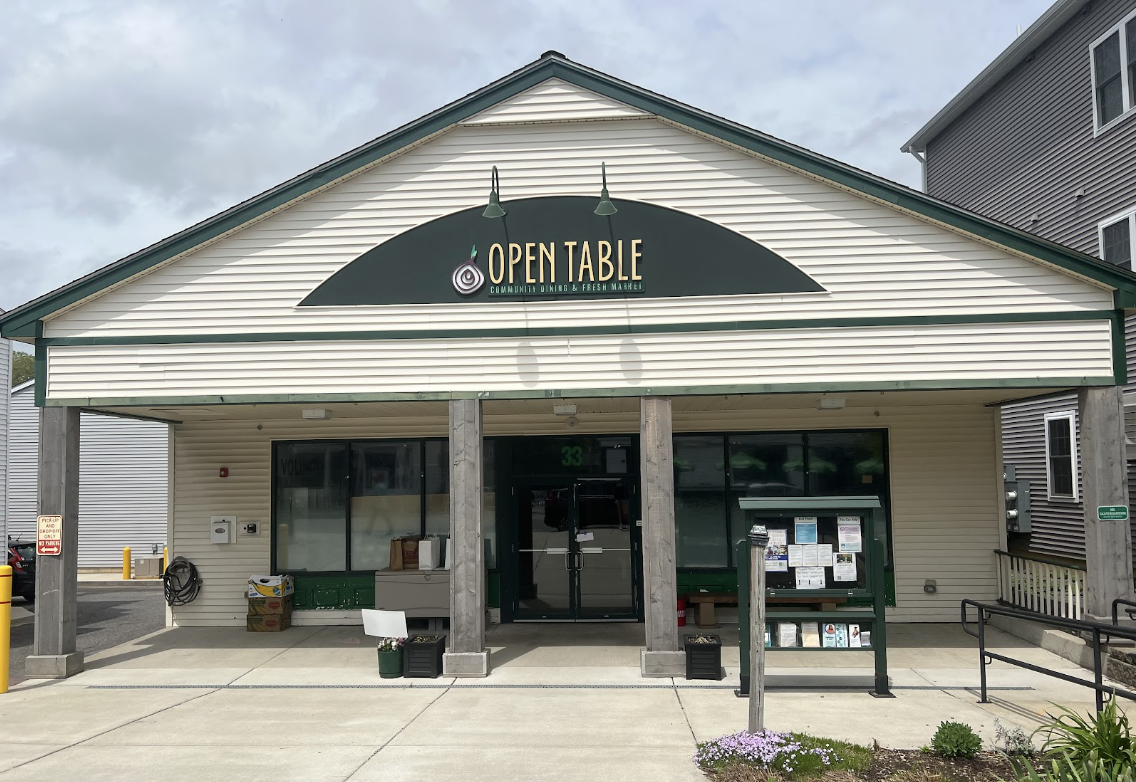Beyond the forest green doors of the Open Table headquarters in Maynard, Massachusetts (MA), rows of volunteers are hard at work, slicing and dicing their way through a variety of specialized grocery orders. As ovens ding and a new shipment of produce freshens the air, the volunteers rifle through ingredients to create nutritious meals that meet recipients’ requests. These thoughtfully crafted food packages will be sent off to food pantries, drive-throughs and door steps across the community, providing individuals and families facing food insecurity with healthy ingredients and meals. Like their token onion logo, the benefits of this organization are layered, strengthening communities and fighting hunger one meal at a time.
In 2023, there were 733 million people globally struggling with hunger due to food shortages, 47 million of which were U.S. residents. If one has never had to worry about food, it can be difficult to understand the gravity of these numbers, but food insecurity is a condition that can affect anyone and everyone.
Serving 21 cities and towns in Middlesex County, MA, “Open Table” is a non-profit organization based in Maynard that’s mission is to make food accessible to people in the greater Boston area. Their work provides people in neighboring communities with clean, nutritious food in a way that preserves dignity and discretion.
Open Table was founded in 1989 by a small group of volunteers with the common goal of reducing hunger and food insecurity in their community. It has now grown into a flourishing operation, with over 570 volunteers and full-time staff who handle the logistical and fundraising aspects of the organization.
Open Table relies on partnerships with local food banks and grocery stores that provide the organization with an inflow of healthy and nutritious meals and ingredients. After receiving these stores of food, they sort through each item and create specialized grocery packages, prepared meals and dining bags that they distribute according to customers wishes.
Every package, bag and meal Open Table creates is completely free of cost, fulfilling the mission statement to make food more accessible. They offer this versatility in their food programs to maximize accessibility of their services, providing specified packages for seniors, children and individuals who might find it difficult to travel. The bulk of this work is facilitated by a team of over 500 volunteers
“We couldn’t run the actual operation without the volunteers,” Open Table Executive Director Alexandra Depalo said. “It just wouldn’t be possible.”
Deliveries, cooking, sorting and restocking are just a few tasks volunteers complete, all playing a pivotal role to the distribution and quality of the groceries.
A unique feature of the volunteer team is the High School Volunteer Program, which can offer an enriching opportunity to teenagers in the community.
Cooking in that kind of environment is a team activity that gives students an opportunity to work together to benefit others. This kind of collaboration can create a positive environment that promotes new friendships and personal growth.
“Those things [(collaboration in the kitchen)] build teamwork and hopefully create connections,” varsity football coach and culinary class teacher Scott Parseghian said. “That’s what I love as a coach.”
Additionally, it encourages a deeper sense of real-world awareness that can be especially beneficial for developing minds.
For some growing up in Middlesex County, food insecurity is a distant and unfamiliar concept. That being said, for 12.3% of the country, the uncertainty of when the next meal might come is a constant worry drilling into the back of minds.
According to Traceone, 12.3% of Americans rely on the American food assistance program Supplemental Nutrition Assistance Program benefits, illustrating the harsh reality that is food scarcity. With a rise of food-based tariffs and a steady increase in inflation, anyone, regardless of income, can find themselves struggling to stay above water.
“Working here is a good reminder you may think [food insecurity] will never happen to you, but just a couple things can go off kilter in life, and it can happen,” Depalo said. “Whatever we might think in our head is the picture of a person who you know doesn’t have enough money for food and other basic needs, is probably wrong because it’s so much more complicated than that.”
According to an article by Search Inside Yourself Leadership Institute, awareness of real world issues is critical to the formation of a more belonging and empathetic society, which benefits everyone.
“Exposure to this kind of work is really important,” Depalo said. “It’s just great exposure for young people to see how they can make a positive difference.”
The benefits aren’t exclusive to a greater sense of awareness though. The Wayland Council on Aging’s partnership with Open Table facilitates connections between community members that may be unlikely to occur outside of the service.
The Council on Aging is a program designed to meet the needs of Wayland’s elderly population while promoting dignity, diversity and respect. A key part of this organization is connecting this part of the community to local people and resources that provide specialized services and care.
Wayland resident Maura Snyder is the outreach coordinator for the Council on Aging, whose job is to connect senior citizens to these resources and services. Shortly after she joined the organization, she noticed a number of residents looking for alternative options for food. There were already a few programs in the area that the council worked with, but with transportation barriers and some citizens with fixed incomes being affected by inflation, the current options weren’t all ideal.
“Those programs didn’t fit everybody’s needs,” Snyder said. “We were seeing that there was a need for connecting people to food pantries.”
Open Table was an apt solution, with their services offering nutritious meals, senior lunches and door-to-door transportation. The Council on Aging promptly reached out to Open Table and began their partnership.
“I think it’s always important to help some of our most vulnerable populations, so partnering with Open Table just made sense,” Snyder said.
Every Friday, volunteers with Open Table help Wayland senior citizens craft their online orders, which arrive at their front door step, by the following Thursday. This is an optional service, but it ensures participating residents get exactly what they want and no one falls through the cracks.
Beyond the surface level nutritional benefits and ease, it also facilitates valuable face-to-face connections between volunteers and senior citizens. While these interactions may seem small, they can be exceedingly important. Senior populations are specifically prone to isolation, with fear, health concerns and smaller circles sometimes cutting people off from consistent relationships. A recent study from NIH showed that there can be significant health concerns associated with loneliness in seniors, emphasizing the gravity of these connections.
“Isolation is a huge issue for all demographics, but in particular with seniors,” Snyder said. “The volunteers who drop off the food have built relationships with the seniors that they see, and that’s been a really positive thing.”
These relationships create a positive feedback loop that supports the overall strength of communities. The volunteers gain awareness and empathy through their work, and the senior citizens get to feel represented in their towns. This benefits their overall health in the long run, with feelings of acceptance and belonging making people more comfortable with asking for assistance.
“When people feel cared for and seen, it makes it easier for them to reach out for help and support in other ways,” Snyder said. “It means a lot to the seniors to know that people are doing that for them.”
While these kinds of interactions are desired by some communities, the promotion of accessibility means accommodating people’s comfort level when receiving these kinds of services.
While far too common, food insecurity can invite feelings of shame and self-deprecation for individuals and families struggling, making it harder to ask for help.
“I think a lot of people feel like they should be able to provide their household with food,” Depalo said. “They can feel somewhat embarrassed or ashamed of the need for food and don’t want to be in a situation where it’s open to the public that they need this kind of help.”
To combat this, Open Table prioritizes versatility in the ordering process to protect customers discretion, a trait reflected from order to delivery. The team doesn’t require extensive details about the situation one is in in order to provide their services. Instead, they collect minimal information about food preferences and trust that people don’t abuse their program.
“We don’t make people prove that they don’t have enough money to use our services,” Depalo said. “We figure if you’re coming to a food pantry, you probably need food, so we are going to help you out.”
Their methods of food delivery allow the recipient to choose the level of social interactions, with drive through pantries open Tuesday and Thursday that allow clients to pre-order online and simply pick up their orders with no personal exchanges. On top of this, they offer straight-to-the-door delivery services that mitigate face to face interaction between the volunteer and the client.
“There’s just a real focus on the dignity of the people that they serve,” Snyder said. “They really do go above and beyond.”
Their ability to provide these services in a cost-free and versatile way is dependent on funding from donations and grants, meaning the involvement of communities is crucial, whether that be through volunteering or donations.
This help is needed now more than ever with impending grant cuts by the Trump Administration, which creates uncertainty around fundraising while increasing the amount of help and resources Open Table has to use to help its community.
“It’s going to be a really interesting next few months and year to see how some of these changes affect us and how we get through them,” Depalo said. “Our biggest goal right now is to picture the financial effect of what’s going on with funding cuts to meal programs and food banks.”
To support Open Table and the communities they serve, through this period of uncertainty, people can donate funds, groceries and time, whether that be through volunteer work, or specialized events, like Chopped for Charity, an annual gala and cooking competition Open Table will host on May 30th.
While it can seem like one person’s donation isn’t that impactful, it is the very fuel the organization runs on and will allow it to continue to offer its services to those in need. Helping feed local communities is a feat that goes beyond the reduction of hunger itself, promoting the creation of relationships and the overall mental and physical health of our communities in the process.
“I think it’s a positive thing that this program addresses things outside of just nutrition,” Snyder said. “At the end of the day, food is a basic human need, so if we can provide that, it has a positive impact on other parts of a person’s life.”
Information about volunteering opportunities can be found here



























